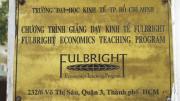The government of Vietnam has approved in principle the establishment of Fulbright University Vietnam (FUV), that country’s first private, nonprofit institution of higher education. FUV will be based upon the Fulbright Economics Teaching Program (FETP), established in Ho Chi Minh City in 1994 and since affiliated with Harvard’s Vietnam program, as reported in Harvard Magazine’s recent feature, “A Nation, Building.”
According to an announcement posted by FETP, on June 3, the prime minister approved in principle the proposal for the nonprofit university, to be grounded in “the principles that are prerequisites for educational excellence: academic freedom, meritocracy, transparency, and accountability.” As noted, the transition from FETP to a more ambitious university “was first mentioned officially in the Joint Statement of US President Barack Obama and Vietnamese President Truong Tan Sang in late July last year and later was reiterated in US Secretary of State John Kerry’s visit to Vietnam in December the same year.”
The plan envisions expanding from the current master’s degree in public policy to similar degree programs in management and in technology. Broader undergraduate and doctoral programs are envisioned subsequently. Together, they represent a significant broadening of Vietnam’s spectrum of higher-education institutions, many of which focus narrowly on engineering or technical subjects, or are proprietary schools offering language or management training; the country does not now have a keystone, liberal-arts- and research-focused higher-education institution operated on the academic principles that are found in comparable universities in Korea, Japan, or the United States.
In an extensive interview on the project, Thomas Vallely—former director of Harvard’s Vietnam program, and now senior advisor, mainland Southeast Asia programs at the Kennedy School’s Ash Institute, and chair of the nonprofit institution seeking to establish and fund the new university—said:
FUV seeks to raise $50 million during the next three years and to mobilize $100 million by 2020. The Vietnamese Prime Minister’s approval in principle for [the] investment in FUV is probably by far the strongest and most specific support for the initiative from the Vietnamese government.…It is hoped that FUV will set an example of effective higher-education governance and quality assurance in the Vietnamese higher-education system.
In outlining the academic program, Vallely said:
When FETP was first established in 1994, in order to meet the needs of the country’s economic reforms, FETP offered the one-year postgraduate program in applied economics and public policy which taught off-the-shelf market economy using textbooks and curriculum from Harvard’s John F. Kennedy School of Government. Over time, FETP has developed its one-year program into the current MPP program which began in 2008. FETP’s steady flow of high-quality research ensures that the curricula remain highly relevant to Vietnam’s constantly evolving economic conditions.
Similar to the MPP program, FUV’s new degree programs will be developed in cooperation with American academic partners and with the consultancy of the business community to ensure the quality and market relevancy of FUV’s curricula in order to meet the need of a skilled labor force [for] Vietnam’s economy.
FUV’s founders envision that great universities are part of the wider community and draw strength from their relationship with business, government and civil society groups. The new institution’s stakeholders are already engaged in a dialog with the business community in Vietnam. This type of institutionalized engagement with the corporate community will provide the much needed feedback loops which are critical to ensure that the FUV’s teaching programs respond to the demands of business for skilled managers and technicians and that FUV’s programming directly supports Ho Chi Minh City and Vietnam’s continued economic development.
As a private, autonomous institution, FUV’s survival will hinge on its ability to mobilize resources from within Vietnamese society. This will provide the institution with strong incentives to remain responsive to business, alumni and the wider community.









